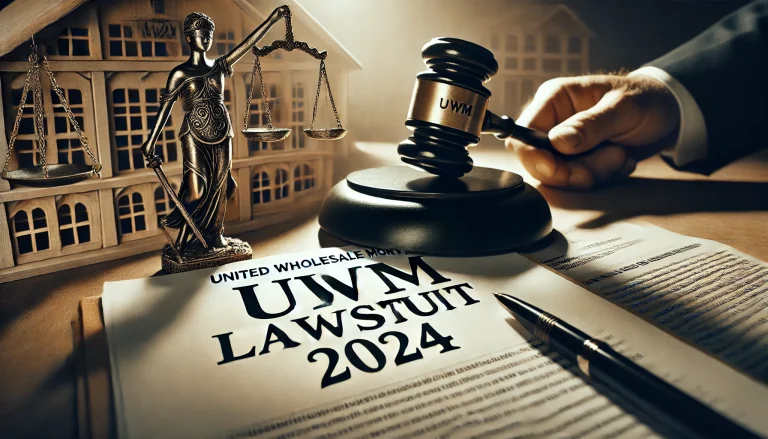In 2024, United Wholesale Mortgage (UWM), one of the largest mortgage lenders in the United States, found itself embroiled in several significant legal battles under the spotlight of the UWM lawsuit 2024 cases. These lawsuits are crucial for understanding not just UWM’s business practices, but also their potential impact on the mortgage industry as a whole. This article will provide an in-depth look at the UWM lawsuit 2024, the legal outcomes so far, and what they mean for the company and the wider industry.
Types of Lawsuits Against UWM in 2024
Antitrust Lawsuit
One of the most notable legal battles UWM faced in 2024 was an antitrust lawsuit filed by the Okavage Group, a mortgage brokerage. The Okavage Group accused UWM of enforcing anti-competitive practices through its “All In” initiative. This initiative required mortgage brokers to stop working with UWM’s competitors, including companies like Rocket Mortgage and Fairway Independent Mortgage Corporation.
The lawsuit claimed that UWM’s policy violated antitrust laws by trying to dominate the market and prevent healthy competition. However, in September 2024, a Florida federal court dismissed the lawsuit, stating that the evidence presented was insufficient to support the claims. Despite this setback, the Okavage Group decided to appeal the ruling, meaning the legal process is still ongoing.
The outcome of this case could have long-term consequences, not only for UWM but also for how antitrust laws are applied in the mortgage industry, especially regarding business policies that may limit competition.
Class Action Lawsuit
Another major legal challenge UWM faces is a class action lawsuit accusing the company of a range of illegal practices, including racketeering, civil conspiracy, and violations of the Real Estate Settlement Procedures Act (RESPA). The lawsuit also includes claims of unjust enrichment, arguing that UWM gained unfair financial advantages at the expense of brokers and consumers.
In October 2024, the court denied UWM’s motion to dismiss the case, which means the lawsuit will proceed. This decision is significant because it means UWM will have to defend itself against serious legal accusations. The class action lawsuit could involve a large group of people and, if successful, could lead to significant financial consequences for the company.
These legal proceedings are important for both UWM and the mortgage industry. If the court finds UWM guilty of the accusations, it could encourage other companies to reassess their business practices, potentially leading to more regulation in the mortgage industry.
Trademark Infringement Lawsuit
UWM also pursued a trademark infringement lawsuit in 2024. The company filed the lawsuit against Ramon Walker, the owner of Client Direct Mortgage, who created a Facebook group called “Rocket Pro TPO vs. UWM.” UWM accused Walker of using the company’s trademarked intellectual property without permission. Specifically, they alleged that Walker’s use of UWM’s name and brand on social media violated trademark laws.
In addition to the trademark claims, UWM sought to recover an early payout balance owed by Walker. This case demonstrates how UWM is actively working to protect its intellectual property and its brand, even in digital spaces like social media. UWM had previously issued a cease-and-desist order, but when Walker continued using the company’s intellectual property, the lawsuit followed.
UWM Lawsuit 2024: Key Legal Challenges and Their Impact on the Mortgage Industry
In 2024, United Wholesale Mortgage (UWM), one of the largest mortgage lenders in the U.S., is facing several high-profile legal battles that could have lasting effects on its business practices and the broader mortgage industry. These lawsuits, including antitrust, class action, and trademark infringement claims, highlight the increasing tension between large corporations and regulatory frameworks.
The antitrust lawsuit focuses on UWM’s “All In” initiative, which allegedly forced brokers to cut ties with competitors like Rocket Mortgage. Critics argue this stifled competition in the mortgage market. Although a Florida court dismissed the case, the Okavage Group has appealed the decision, and the case continues to capture attention.
In addition, UWM is defending itself against a class action lawsuit, which accuses the company of violating multiple laws, including the Real Estate Settlement Procedures Act (RESPA), racketeering, and civil conspiracy. If the court finds in favor of the plaintiffs, it could lead to significant penalties for UWM and set new legal standards for the mortgage industry.
Moreover, UWM has filed a trademark infringement lawsuit against Ramon Walker of Client Direct Mortgage, accusing him of using its intellectual property without permission. This case underscores the company’s commitment to protecting its brand and intellectual property.
These ongoing legal disputes emphasize the importance of regulatory compliance in the mortgage industry. If UWM loses any of these lawsuits, it could face financial and reputational damage, while the broader industry may see increased scrutiny and potential changes in competitive practices. The outcomes of these lawsuits will likely set precedents for how mortgage companies operate in the future.
Implications of the Lawsuits
Industry-Wide Reactions
These lawsuits have not only drawn attention to UWM but have also sparked conversations throughout the mortgage industry. UWM’s “All In” initiative and aggressive business strategies have received mixed reactions. On one hand, some brokers and industry experts argue that the policies help UWM offer better pricing and more consistent services. On the other hand, critics claim that such policies could limit brokers’ ability to work with multiple lenders, ultimately reducing competition in the market.
The legal challenges UWM faces could lead to greater scrutiny of its business practices by other companies, brokers, and regulatory bodies. This may prompt other players in the industry to revisit their own business models, especially regarding broker-lender relationships and competitive strategies.
Legal and Financial Risks
The lawsuits present serious legal and financial risks for UWM. Legal costs can quickly add up, especially when dealing with multiple cases. If the company loses any of these lawsuits, it could be ordered to pay damages or face other financial penalties, which could hurt its bottom line.
Additionally, these lawsuits could damage UWM’s reputation. In the mortgage industry, relationships with brokers and consumers are crucial, and any legal setbacks could cause brokers to reconsider doing business with UWM or even drive consumers away. The brand image of a company can take years to build and only moments to damage, so UWM’s ongoing legal troubles could have far-reaching consequences.
Broader Context of UWM’s Legal Strategy
Despite the legal challenges, UWM has shown resilience in defending its business practices. The “All In” initiative, for example, is central to UWM’s strategy to gain a competitive edge. By making sure brokers work exclusively with UWM (or refrain from working with competitors), UWM aims to offer more competitive rates, better service, and greater pricing consistency. UWM believes that such policies are in the best interests of both brokers and consumers, as they can help reduce costs and streamline operations.
In addition to this, UWM’s efforts to protect its intellectual property reflect the company’s broader strategy to maintain control over its brand and its marketing. In an age where digital presence and branding are crucial to success, UWM is keen to ensure that its intellectual property is not misused by others.
Last Word
The UWM lawsuit 2024 is shaping up to involve some of the most significant legal battles in the company’s history. With accusations ranging from antitrust violations to trademark infringement, these cases highlight challenges that go beyond UWM, affecting the entire mortgage industry. The resolutions of these lawsuits could set critical precedents for how mortgage companies conduct business, safeguard their intellectual property, and compete in a highly regulated market.
FAQs
What is the main accusation in the UWM antitrust lawsuit?
UWM was accused of enforcing anti-competitive practices through its “All In” policy, requiring brokers to stop working with certain competitors.
Why was the UWM antitrust lawsuit dismissed?
A Florida federal court dismissed the lawsuit, citing insufficient evidence to prove UWM violated antitrust laws.
What laws are involved in the UWM class action lawsuit?
The class action alleges violations of the Real Estate Settlement Procedures Act (RESPA), racketeering, and civil conspiracy laws.
What triggered the UWM trademark infringement lawsuit?
UWM sued Ramon Walker for using its intellectual property without permission in a Facebook group banner.
What impact could these lawsuits have on UWM’s future?
The lawsuits could damage UWM’s reputation, lead to financial penalties, and potentially bring stricter industry regulations.
Article Recommendations
Wendys Lawsuit Michigan: What the Case Reveals About Corporate Accountability in the Food Industry
Third Culture Bakery Lawsuit: How Public Opinion Influences Intellectual Property Decisions
Abilene Asbestos Legal Question: How to Identify, Handle, and Seek Justice for Asbestos Exposure




